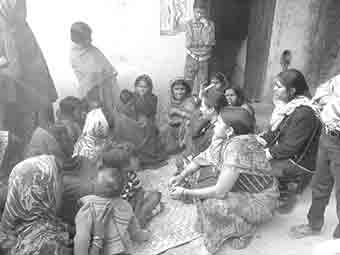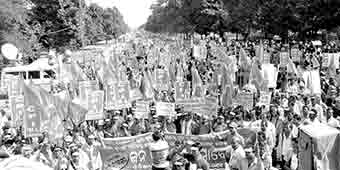
The liquor deaths are no sudden aberration nor are they being caused only by ‘illicit’ liquor. The unfortunate people who died in Gaya the other day had all bought their drink of death from liquor shops with proper official licence. Death came in liquor sachets bearing the official imprint of Nitish Kumar’s ‘good governance’. On latest official count Bihar was found having a huge network of 5,624 licensed liquor shops. Almost every panchayat in Bihar today has a licensed liquor shop and it is an open secret that for every licensed liquor shop there are at least two unlicensed ones. Contrary to the government’s claims, the expansion of the licensed network has not eclipsed or replaced the illicit network; rather the two have grown in tandem with the legal serving as a front for the illegal.
This rapid expansion of the network of liquor shops is central to Nitish Kumar’s economics and politics of ‘good governance’. The government proudly points to the growing revenue – from a paltry Rs 329 crore in 2005-06 the revenue accrual from liquor has gone up to Rs 2,045 crore in 2011-12. If revenue has recorded a six-fold increase in six years, one can easily imagine how huge must have been the jump in the profit earned by the liquor lobby. Any independent investigation will reveal a massive excise scam thriving behind the curtain. We all remember how Nitish Kumar had summarily sacked his excise minister Jamshed Ashraf in February 2010 for seeking a probe into a Rs 500 crore scam in his department.
Even as Bihar mourns the deaths of the hundreds of hapless liquor victims, Nitish Kumar had the temerity to suggest that his fancy populist schemes like distribution of school uniform or cycles among girl students could only be funded by the revenue flowing in from the growing production and sale of liquor. Could it not be argued equally emphatically that the revenue from liquor was being used to fund his government’s self-congratulatory advertisements and his wasteful yatras aimed at self-promotion?
It is well known in Bihar that the liquor mafia has emerged as a principal prop of the new regime. In fact, the feudal-kulak kingpins of the infamous kidnapping industry of yesteryear have now turned in a big way to real estate, construction contracts and liquor trade. Nitish Kumar’s vision of ‘development’ is of course not confined to the home-grown liquor mafia; liquor barons like Vijay Mallya are also spreading their tentacles in Bihar. If Nitish Kumar can have his way, the sugar mills of Bihar will all give way to alcohol and bio-fuel. Yet faced with a popular outrage, Nitish Kumar is now waxing eloquent against the liquor mafia, and in a most glaring display of hypocrisy his government observed November 26, the day Nitish Kumar was sworn in for his second term, as a ‘prohibition day’!
The systematic spread of liquor remains a key factor behind the alarming increase in violence against women and the renewed spurt in crimes and social oppression. Girls in Bihar have been right in affirming that if cycles are to be funded by liquor-driven revenue then they would rather prefer to do without such cycles. Bihar cannot afford to bear the social cost of Nitish Kumar’s liquor-promotion drive, a fact realised most acutely by the women of Bihar who are fighting in the forefront of the anti-liquor campaign. The youth must now join hands with the women to challenge the liquor mafia and the government that disburses death in liquor sachets. The anti-liquor movement in Bihar has already thrown up role models like Comrade Bhaiyaram Yadav, the young secretary of CPI(ML)’s Rohtas district committee, who was killed earlier this year for taking on the liquor mafia and rising in defence of the dignity of women. The combined might of Bihar’s fighting youth and women can surely trounce the liquor mafia and their political patrons.
